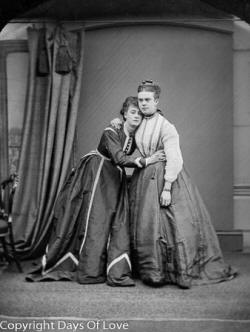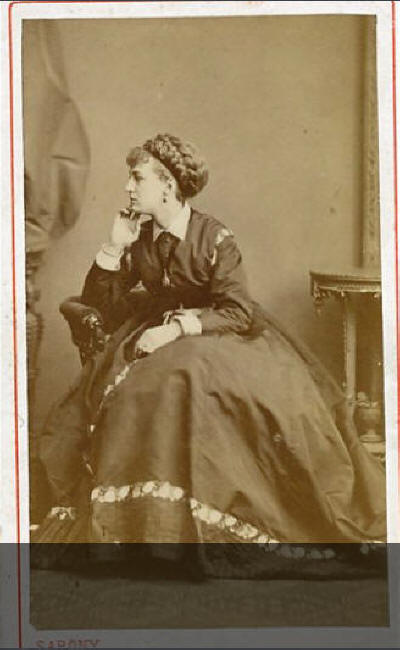Queer Places:
13 Wakefield St, London N18 2BZ
36 Southampton St, London WC2E 7HA
108 Princes St, Edinburgh EH2 3AA
 Thomas
Ernest Boulton and Frederick William Park were two Victorian
cross-dressers and suspected
homosexuals who appeared as defendants in a celebrated trial in
London in
1871, charged "with conspiring and inciting persons to commit an unnatural
offence". After the prosecution failed to establish that they had
anal sex,
which was then a crime, or that wearing women's clothing was in any sense a
crime, both men were acquitted.
Thomas
Ernest Boulton and Frederick William Park were two Victorian
cross-dressers and suspected
homosexuals who appeared as defendants in a celebrated trial in
London in
1871, charged "with conspiring and inciting persons to commit an unnatural
offence". After the prosecution failed to establish that they had
anal sex,
which was then a crime, or that wearing women's clothing was in any sense a
crime, both men were acquitted.
(Thomas) Ernest Boulton (1847–1904) was born on 18 December 1847 in
Tottenham, Middlesex, England, the son of stockbroker Thomas Alfred Boulton
and his wife, née Mary Ann Sarah Levick. From childhood the young Boulton
liked wearing female clothing, and was encouraged in his impersonations of
maids and other women by his mother; he used the nickname "Stella". Boulton
started work as a clerk at his uncle's stockbroking firm and then briefly at
a bank, before leaving in 1866 or 1867.[1]
Park was initially an
articled clerk (law student) with a London solicitor. Frederick William
Park (1846–1881) was born on 21 November 1846 and christened on 5 January
1847 in Wimbledon, Surrey, the son of barrister Alexander Atherton Park,
Master of the Court of Common Pleas (a superior court) and his wife, née
Mary Frances Brown.
As they became friends, Boulton and Park formed a theatrical double act,
touring as Stella Clinton (or Mrs Graham) and Fanny
Winifred Park, and receiving favourable press reviews for their
performances.[2]
For around two years they also frequented the
West End of London in both women's and men's dress, attending theatres
and social events. They were ejected from both the
Alhambra Theatre and the
Burlington Arcade on several occasions. On one occasion they were
bound over to keep the peace after being mistaken for women dressed as
men.[1]
.jpg)
Lord Arthur Pelhan-Clinton, Stella and Fanny, by Frederick Spalding, c.
1870
_2.jpg)
Stella and Charles Pavitt
_3.jpg)

Ernest Boulton as Miss Stella Boulton.
A third person involved in the affair was
Lord Arthur Clinton, who had lived with "Stella" as husband and had
exchanged love letters with Stella.[3][4][5]
On the evening of 28 April 1870 Boulton, Park and another man were seen
leaving a house in Wakefield Street, near Regent Square, by a police
detective, who followed them as they took a cab to the
Strand Theatre. There the detective saw them meet two others, described
as "gentlemen", before the party entered a private box inside the theatre. A
police superintendent and a police sergeant joined the detective during the
performance, and Boulton, Park and one of the others, Hugh Alexander
Mundell, were arrested as they attempted to leave the theatre. The others
escaped.[6]
The three arrested men were subjected to intimate examination by a police
doctor in order to establish whether they had had anal sex.[7]
When brought before the magistrate,
Frederick Flowers, at
Bow Street Magistrates' Court the next day, Boulton and Park were still
wearing women's clothing, which was described in some detail in newspaper
reports. Mundell claimed that he had believed that Boulton and Park were
women, even though he had previously met them while they were dressed in
men's clothes. He was given bail, but Boulton and Park were not. The case
attracted considerable attention and a large crowd had collected in Bow
Street to see the two leave in a police van.[6]
Subsequent magistrates' court hearings also attracted unusually large
numbers of spectators to witness the proceedings.[8]
The indictment was against
Lord Arthur Clinton, Ernest Boulton, Frederic Park, Louis Hurt,
John
Fiske, Martin Cumming, William Sommerville and C. H. Thompson. The last
three absconded before the trial.[9][10]
John Fiske was an American citizen and the United States
consul at
Leith, Edinburgh.[1]
Lord Arthur died on 18 June, the day after receiving his subpoena for the
trial, ostensibly of scarlet fever but more probably a suicide.[5]
However, there was speculation at the time that, helped by powerful friends,
he faked his death and fled abroad, to live on in exile. The author Neil
McKenna cites circumstantial evidence that supports this theory.[11]
The trial began on 9 May 1871 at the
Court of Queen's Bench, before a special jury.[1]
It was presided over by
Sir Alexander Cockburn, the
Lord Chief Justice.[12]
At the hearing Boulton and Park's lifestyle attracted great public interest,
especially when a trunkful of their dresses was brought in as evidence.
However, the unreliability of the witnesses and their physical examination
by the police without higher authority swayed opinion in their favour. The
prosecution was unable to prove either that they had committed any
homosexual offence or that the wearing of women's clothing by men was an
offence in English law.[5]
Cockburn's summing up was critical of the prosecution's case and the
behaviour of the police.[13]
After deliberating for fifty-three minutes the jury found them not guilty.[3][14]
In 1870, the Simeon Solomon
had attended the trial of the infamous transvestites ‘Fanny and Stella’,
Ernest Boulton and
Frederick Park. Writing to his
close friend and illicit lover, Cambridge don
Oscar Browning in May 1870,
Solomon revealed that he had been intrigued by the newspaper coverage of the
arrest and, somewhat tongue-in-cheek, supposed that they were probably ‘a
most disreputable set of young men’. After both men were acquitted in March
1871, Solomon became friends with Boulton, a budding actor, and attended the
Prince’s Theatre in Manchester with him later that year, with Boulton
cross-dressed as his alter-ego Stella. Solomon wrote that he went to see the
pantomime Bluebeard with Boulton on his arm, describing him as ‘a charming
young lady’.
In 1882 there was a subsequent bizarre development when a Mary Jane
Furneaux was convicted of impersonating Lord Arthur Clinton in a
cross-dressing fraud case. Furneaux convinced her victims that she was Lord
Arthur Clinton disguised as a woman and that his reported death was a cover.[15]
Ironically, while Clinton had no creditworthiness at the time of his death,
Furneaux succeeded in obtaining 15,000 pounds. Such was the interest in the
case that it prompted the selling of cheap biographies of Furneaux.[16]
Boulton and Park appear as characters in
The Sins of the Cities of the Plain (1881), a pioneering work of
homosexual
pornographic literature. In this story, the cross-dressing narrator
recounts how he meets Boulton and Park dressed up as women at Haxell's Hotel
in the
Strand, with Lord Arthur trailing along behind. Later on, the narrator
spends the night at Boulton and Park's rooms in
Eaton Square, and the next day has breakfast with them "all dressed as
ladies".[17]
Boulton and Park appear in the play
Lord Arthur's Bed (2008) by the English playwright Martin Lewton.
The play was premiered at the Brighton Festival on 14 May 2008. It
subsequently toured nationally in 2008 and was transferred to Dublin in
2009.
A stage play by Taggart writer
Glenn Chandler, based on the story of Fanny and Stella and entitled
Fanny and Stella: The Shocking True Story, was to be performed at the
Above the Stag venue on London in May–June 2015.
Neil Bartlett's play Stella was co-commissioned by the
London International Festival of Theatre (LIFT),
Holland festival and
Brighton Festival. Stella premiered at
Brighton Festival[18]
on May 28, 2016 and ran for three weeks from the 1 June at Hoxton Hall as
part of LIFT festival, ending in Amsterdam as part of Holland festival.[19]
My published books:


BACK TO HOME PAGE

- https://en.wikipedia.org/wiki/Boulton_and_Park
- Rossini, Gill. Same Sex Love 1700-1957: A History and Research Guide .
Pen and Sword. Edizione del Kindle.
- Simon Avery and Katherine M. Graham. Sex, Time and Place . Bloomsbury
Publishing. Edizione del Kindle.
 Thomas
Ernest Boulton and Frederick William Park were two Victorian
cross-dressers and suspected
homosexuals who appeared as defendants in a celebrated trial in
London in
1871, charged "with conspiring and inciting persons to commit an unnatural
offence". After the prosecution failed to establish that they had
anal sex,
which was then a crime, or that wearing women's clothing was in any sense a
crime, both men were acquitted.
Thomas
Ernest Boulton and Frederick William Park were two Victorian
cross-dressers and suspected
homosexuals who appeared as defendants in a celebrated trial in
London in
1871, charged "with conspiring and inciting persons to commit an unnatural
offence". After the prosecution failed to establish that they had
anal sex,
which was then a crime, or that wearing women's clothing was in any sense a
crime, both men were acquitted. .jpg)
_2.jpg)
_3.jpg)


